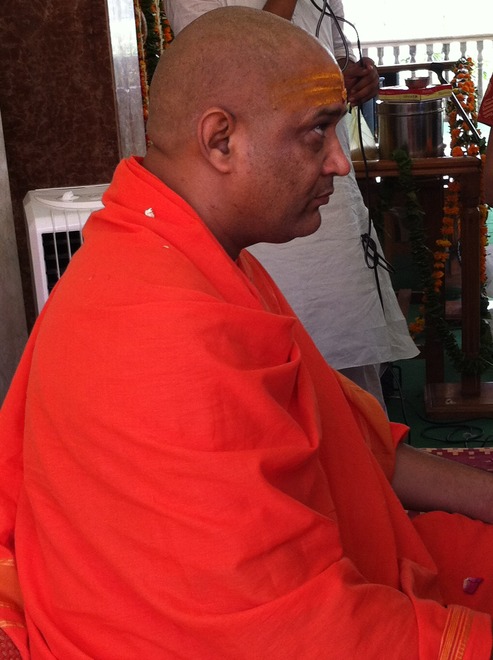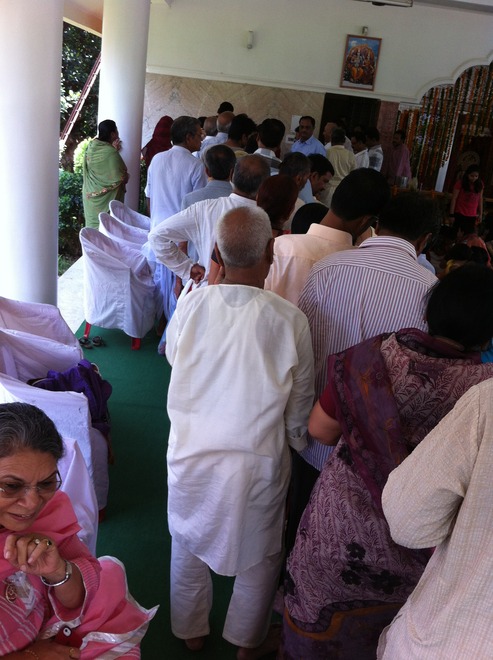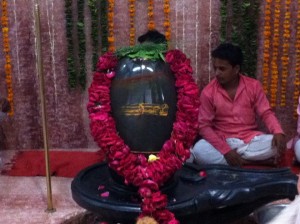In my last dispatch, I ended on the premise of trying to understand my culture through interaction with one of its holy men, posing the query: what is the functionality of a guru? After meeting my grandmother’s guru, Swami Grishanand Saraswati, the answer became quite simple. A guru is a man who forsakes the banality and materialism of everyday life (in Swami Grishanand’s case, at 18 years old) for a purely spiritual existence, fulfilled through total dedication to studying the Vedas, Bhagavat Gita, Manu Smriti, Srimad Bhagavat, and various other canonical Hindu texts in order to achieve a greater comprehension of the celestial workings of the universe. But this comprehension is not a paltry tool used to pull the wool over the eyes of those lost in the world, seeking guidance or direction in lives they cannot seem to properly helm. Just as water seeks nobody to consume it, a guru does not seek followers to thirst for his knowledge. He doesn’t place money or praise or control as motive. His goal is the achievement of self-betterment through conscious reflection and the genuine care for his fellow man.

To put it bluntly, a guru is a wise man, but he does not care whether or not you listen to him.
Some people only come to a guru when they want something, whether a blessing to cure a particular ailment or well wishes for monetary income or simply to act like they’re doing their guru a favor by being his student. These are the kind of people on whom Guru-ji spends little to no time in a one-on-one setting. But come to him without reservations or material desires, armed with a willing heart and an open mind, and see what a powerful individual he becomes with his knowledge.
On Swami Grishanand’s birthday, hundreds of his disciples from all over India came to pay their respects. They brought food, gifts, and money to show their devotion to him for changing their thoughts and lives with his teachings. But Guru-ji gave the sweets to the hungry; he found ways to dispense the gifts among the poor; and contrary to my ideas of religious figures’ unscrupulous attitudes towards monetary accumulation, all of the money that was given for Guru-ji’s birthday was to be spent entirely on building and maintaining ashrams and orphanages.
It’s not that he doesn’t appreciate the effort people put into these things, but material goods take nothing to cultivate when compared to the simple spiritual connection of being with one’s guru just because one appreciates his person, wants to hear what he has to say, and desires to apply that higher knowledge to his or her own life.

For example, while I was in Jabalpur for Guru Purnima, a holiday celebrating gurus across India, I spent the day going to various points along the holy Narmada river with a friend of my grandmother’s, a man I will call P. P was born poor (and I mean Indian poor), finished high school through correspondence, and started working at 12 years old. Today, at 44 years old, he is a highly successful businessman who owns and operates his own steel import/export business in Dubai with offices all over the world. He wants for absolutely nothing. To put this in perspective, if he wished to expand his operations by moving stateside (which would be laughably easy at this point in his life), he could be pulling $200,000 a month without breaking a sweat. But material concerns aren’t his primary motive, which is why P is one of Swami Grishanand’s closest disciples despite only knowing him for five years.

What makes a wealthy businessman and a holy man so strongly connected? Again, the answer is simple. They desire nothing material, except the trust and faith of one another, the pleasure of one another’s company and the discussion of their thoughts. P told me that he never once tried to achieve wealth for himself; he wanted to be rich since he was 12 years old so he could provide for his family and ensure they would never want for anything. Swami Grishanand did not seek spiritual knowledge for praise, money, or to trick people into worshipping him through accruement of false virtue; he left his home and family at 18 years old for the ashram because he was seeking personal fulfillment, a fulfillment through which he could help his fellow man. Both men have great lives and extraordinary physical and spiritual presence, but they both also concede wholeheartedly that the greatness of their lives, though shaped by selfish and logical choices, are only made possible through selfless devotion to something greater than their individual selves. And that selflessness feeds their selfishness. And their selfishness powers their selflessness. And so it goes.

THAT is the beauty of Hinduism. The serenity of true spirituality is rooted in the power of logical decision-making. And the greatest logic comes from understanding that to achieve an enlightened state of mind, one must be willing to forgo the hubris of human reason for the calm maturity of spirituality. There are no musts or must-nots. Choice is duty, duty is love, love is freedom, and freedom is choice. Hinduism rejects duality and says that all things are one. That’s why a guru both cares for his fellow man, but does not care enough to force them towards enlightenment. That’s why a wealthy businessman and a humble holy man can be the best of friends. I’m young, so I can’t grasp it fully yet, but the fact that separation is just a human invention is a very powerful idea that is now firmly implanted in my mind.
And as such, I learned that the purpose of a guru is to help reform his disciples’ idea of duality into non-duality, to remove barriers of separation for the open space of unity.
Overall, here’s what I have to say: What a trip! And I mean that literally and figuratively.